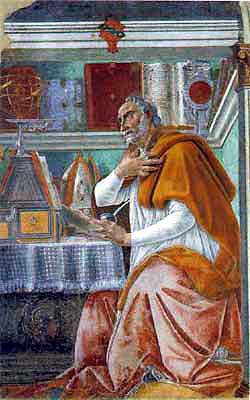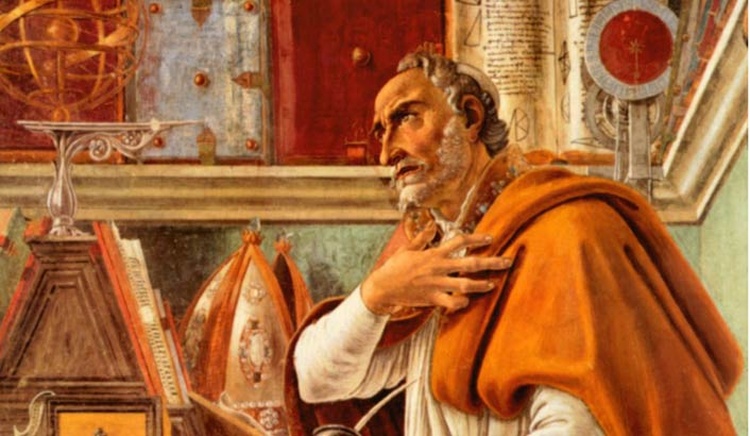Aurelius Augustine, 354-430 AD, was a church father and theologian who made a remarkable impact, to the point that nearly all of us today are in his debt for some of the distinctives of our theology. After pursuing a life of selfishness and immorality, through the prayers of his mother and the grace of God, Augustine came to faith in Christ. If you want to know more about him, check here, though you (and all students doing term papers) should remember that Wikipedia is not the ultimate reference!  I heartily recommend nearly everything from John Piper, including his The Legacy of Sovereign Joy: God's Triumphant Grace in the Lives of Augustine, Luther, and Calvin.
I heartily recommend nearly everything from John Piper, including his The Legacy of Sovereign Joy: God's Triumphant Grace in the Lives of Augustine, Luther, and Calvin.
“Thou hast made us for Thyself O God, and the heart of man is restless until it finds its rest in Thee.” This captures what’s at the core of all of us. Though apparently Pascal did not say, “There is within every man a God-shaped vacuum, an emptiness that only He can fill,” he should have said it. (I’ve searched for it, and given up; if you ever find it, or something close, in an actual document written by Pascal, let me know.) And that’s the essence of Augustine’s point—since God has made us for him, we will never find rest, peace and meaning in anyone or anything else besides him. What can only be found in the Greater can never be found in the lesser.
This captures what’s at the core of all of us. Though apparently Pascal did not say, “There is within every man a God-shaped vacuum, an emptiness that only He can fill,” he should have said it. (I’ve searched for it, and given up; if you ever find it, or something close, in an actual document written by Pascal, let me know.) And that’s the essence of Augustine’s point—since God has made us for him, we will never find rest, peace and meaning in anyone or anything else besides him. What can only be found in the Greater can never be found in the lesser.
Of course, we will catch glimmers of peace and meaning here and there, but even these are derivative of God, whether or not we recognize that. An atheist can find beauty and awe in God’s creation, but only because his creation is an extension of himself. The creation is beautiful only because it is an extension of the Creator’s beauty.
The moments of pleasure and happiness experienced by the atheist should be rightfully credited to God, who gave him the capacity for pleasure, and by His common grace exposes him to the sources of happiness. At the moment the atheist feels profoundly grateful, he is without knowing it recognizing a personal Being whose gracious provision has prompted those feelings of gratitude. The fact that when he feels thankful the atheist doesn’t know who to thank may be embarrassing, but it says more about himself than God, who is in no danger of being voted out of existence by those who don’t believe in Him.
In a fallen corrupted world, people keep searching and searching, like frustrated channel changers, never finding what satisfies (and often never turning off the TV to look elsewhere). Ultimate satisfaction can be only found in God, the gracious giver of all good things. We were made for Him and we will never be satisfied with less. Coming to grips with this is one of the great keys to Christian living. As long as we hold onto the illusion that we can find what we’re looking for somewhere else, we’ll never give ourselves fully to God. It’s easier not to. And yet, in the long run, the easy road we choose proves to be much harder than the hard road we turned away from.
While we as Christians should know this above all others, how soon we forget. At the end of the day, if we haven’t found a reason for peace and contentment, is it because we were looking in the wrong places and to the wrong people? Christians can live, practically speaking, as if we were atheists.
How many times in the last 24 hours have you consciously looked to God and said “Please, my Savior, help me find in You today all that my heart longs for?” I did it just now, because I wrote it. And I did it, essentially, earlier today twice, once because I wasn’t feeling joyful, and knew I needed to direct my heart to Him to find a reason for joy. The second time was when I was praying for people I love who are facing challenges. I’m facing a few myself. God can use those challenges to remind us we can’t find peace apart from Him.
Augustine prayed, “Turn not away your face from me, that I may find what I seek. Turn not aside in anger from your servant, lest in seeking you I run toward something else….Be my helper. Leave me not, neither despise me, O God my Savior. Scorn not that a mortal should seek the Eternal.”
This is cited by Thomas Hand, in a great book called Augustine on Prayer. Augustine also said, “The whole life of a good Christian is a holy desire.” In his classic autobiography, The Confessions of St. Augustine, he wrote, “How sweet all at once it was for me to be rid of those fruitless joys which I had once feared to lose! You drove them from me, you who are the true, the sovereign joy. You drove them from me and took their place, you who are sweeter than all pleasure.” (Confessions IX, 1.)
In his classic autobiography, The Confessions of St. Augustine, he wrote, “How sweet all at once it was for me to be rid of those fruitless joys which I had once feared to lose! You drove them from me, you who are the true, the sovereign joy. You drove them from me and took their place, you who are sweeter than all pleasure.” (Confessions IX, 1.)
I had those words of Augustine posted on my computer for two years. I think it’s time to print them out again. I vividly remember coming to Christ as a teenager and finding that some of the things I’d most wanted to hold onto no longer had an attraction for me. God was so much better, so much sweeter. Yet as time goes on, other temptations, other distractions come to usurp the place of God who is “the true, the sovereign joy.” May we turn away from those temptations which will never satisfy, and turn to the God who is sweeter than all pleasure. This is Eraina, granddaughter of Janet Albers, our EPM bookkeeper. When Janet saw the picture of a kid by a faucet, which I posted a couple of weeks ago, she showed me this, which I think is adorable, and also conveys the kind of thirst and anticipation we should have when we come to God. (It also shows the lengths to which people will go to get their grandchild’s picture on a blog; not really, it was my idea.)
This is Eraina, granddaughter of Janet Albers, our EPM bookkeeper. When Janet saw the picture of a kid by a faucet, which I posted a couple of weeks ago, she showed me this, which I think is adorable, and also conveys the kind of thirst and anticipation we should have when we come to God. (It also shows the lengths to which people will go to get their grandchild’s picture on a blog; not really, it was my idea.)
Augustine wrote, “All my empty dreams suddenly lost their charm and my heart began to throb with a bewildering passion for the wisdom of eternal truth…My God, how I burned with longing to have wings to carry me back to you, away from all earthly things, although I had no idea what you would do with me!” (Confessions III, 4.)
I love the fact that Augustine didn’t view God as safe. This is one of the great elements of Aslan the Lion in Narnia. He’s good, but He’s not safe. We long for God, but we are not in control. We can’t require Him to do what we want. (Have you noticed that?) So to get what we want, the joy that can only come in knowing God, we have to give up what we don’t want to—control. But since we have such meager control in the first place, and what little we have gets us into so much trouble, isn’t it laughable that we would choose to hold onto what cannot satisfy, so that our hands and hearts have no room for the Sovereign God who alone can satisfy?
“Without exception we all long for happiness…all agree that they want to be happy.…They may all search for it in different ways, but all try their hardest to reach the same goal, that is, joy.” (Confessions, X, 21.)
“Every man, whatsoever his condition, desires to be happy. There is no man who does not desire this, and each one desires it with such earnestness that he prefers it to all other things; whoever, in fact, desires other things, desires them for this end alone.” (Sermon 306).
These last two quotes, which are similar, remind me of a great saying from mathematician and philosopher Blaise Pascal. I think next week I’ll share some thoughts on longing from Pascal.
Meanwhile, consider that we all desire to be happy. We all have the same goal—Joy. We search for it in different places and in different ways. But in the end, there is only one source of ultimate pleasure:
“In your presence is fullness of joy, at your right hand are pleasures forever more.” Psalm 16:11




